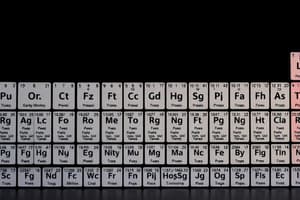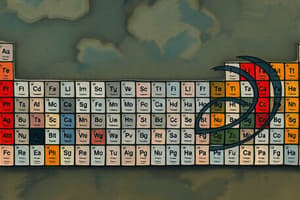Podcast
Questions and Answers
What are the horizontal rows on the periodic table called?
What are the horizontal rows on the periodic table called?
- Groups
- Periods (correct)
- Columns
- Families
What are the vertical columns on the periodic table called?
What are the vertical columns on the periodic table called?
- Families (correct)
- Groups (correct)
- Rows
- Periods
Which of the following characteristics describe metals?
Which of the following characteristics describe metals?
- Solid at room temperature (correct)
- Good conductors of electricity (correct)
- Brittle
- Malleable (correct)
What does malleable mean?
What does malleable mean?
What does ductile mean?
What does ductile mean?
What group do Alkali Metals belong to?
What group do Alkali Metals belong to?
What group do Alkali Earth Metals belong to?
What group do Alkali Earth Metals belong to?
What is the characteristic of Transition Metals?
What is the characteristic of Transition Metals?
What are Metalloids?
What are Metalloids?
Which of the following is a property of Non-metals?
Which of the following is a property of Non-metals?
What group do Halogens belong to?
What group do Halogens belong to?
What group do Noble Gases belong to?
What group do Noble Gases belong to?
What characteristics belong to the Boron Family?
What characteristics belong to the Boron Family?
What characteristics belong to the Carbon Family?
What characteristics belong to the Carbon Family?
What characteristics belong to the Nitrogen Family?
What characteristics belong to the Nitrogen Family?
What characteristics belong to the Oxygen Family?
What characteristics belong to the Oxygen Family?
Where do Lanthanides and Actinides belong on the periodic table?
Where do Lanthanides and Actinides belong on the periodic table?
Study Notes
Periodic Table Overview
- Periods are horizontal rows; same number of electron shells or energy levels.
- Groups (or families) are vertical columns; elements share the same number of valence electrons.
Properties of Metals
- Good conductors of electricity and heat.
- Exhibits malleability, allowing them to be shaped easily.
- Ductility enables them to be drawn into wires.
- Usually solid at room temperature.
Alkali Metals
- Located in Group 1A (excluding Hydrogen).
- Each has one valence electron and forms +1 ions.
Alkali Earth Metals
- Found in Group 2A.
- Contains two valence electrons with a +2 ion charge when ionized.
Transition Metals
- Represented by Group B elements.
- Serve as a bridge between the left and right sections of the periodic table.
Metalloids and Non-metals
- Metalloids display properties of both metals and non-metals.
- Non-metals are generally brittle, dull, poor conductors, and exhibit lower melting and boiling points compared to metals.
Group-Specific Properties
- Halogens (Group 7A) have seven valence electrons and form -1 ions.
- Noble Gases (Group 8A) contain eight valence electrons and are chemically neutral.
- Boron Family (Group 13/3A) has three valence electrons, forming +3 ions.
- Carbon Family (Group 14/4A) possesses four valence electrons with charges of +4 or -4.
- Nitrogen Family (Group 15/5A) has five valence electrons, forming -3 ions.
- Oxygen Family (Group 16/6A) contains six valence electrons with -2 ion charge when ionized.
Lanthanides and Actinides
- Special groups located in periods 6 and 7, respectively, consisting mostly of metals.
Studying That Suits You
Use AI to generate personalized quizzes and flashcards to suit your learning preferences.
Description
Test your knowledge of the periodic table in this quiz, which covers the organization of elements into periods and groups. Learn about the properties of metals, alkali metals, alkaline earth metals, transition metals, metalloids, and non-metals. Perfect for anyone looking to strengthen their understanding of chemistry concepts.




